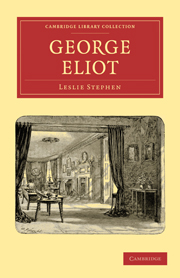Book contents
- Frontmatter
- Contents
- CHAPTER I EARLY LIFE
- CHAPTER II COVENTRY
- CHAPTER III “THE WESTMINSTER REVIEW”
- CHAPTER IV “SCENES OF CLERICAL LIFE”
- CHAPTER V “ADAM BEDE”
- CHAPTER VI “THE MILL ON THE FLOSS”
- CHAPTER VII “SILAS MARNER”
- CHAPTER VIII MIDDLE LIFE
- CHAPTER IX “ROMOLA”
- CHAPTER X “FELIX HOLT”
- CHAPTER XI “THE SPANISH GYPSY”
- CHAPTER XII “MIDDLEMARCH”
- CHAPTER XIII “DANIEL DERONDA”
- CHAPTER XIV CONCLUSION
- INDEX
CHAPTER XIII - “DANIEL DERONDA”
Published online by Cambridge University Press: 05 July 2011
- Frontmatter
- Contents
- CHAPTER I EARLY LIFE
- CHAPTER II COVENTRY
- CHAPTER III “THE WESTMINSTER REVIEW”
- CHAPTER IV “SCENES OF CLERICAL LIFE”
- CHAPTER V “ADAM BEDE”
- CHAPTER VI “THE MILL ON THE FLOSS”
- CHAPTER VII “SILAS MARNER”
- CHAPTER VIII MIDDLE LIFE
- CHAPTER IX “ROMOLA”
- CHAPTER X “FELIX HOLT”
- CHAPTER XI “THE SPANISH GYPSY”
- CHAPTER XII “MIDDLEMARCH”
- CHAPTER XIII “DANIEL DERONDA”
- CHAPTER XIV CONCLUSION
- INDEX
Summary
George Eliot was to write one more novel, and one which was intended to give most clearly her message to mankind. In June 1874 she is “brewing her future big book.” In February 1876 the first part was published; it came out in the same form as Middlemarch, in eight monthly parts, and had from the first a larger sale than its predecessor. Here again we have the doctrine of ideals, and expounded with even more emphasis. The story is really two stories put side by side and intersecting at intervals. Each gives a life embodying a principle, and each illustrates its opposite by the contrast. Gwendolen Harleth, a young lady with aspirations in a latent state, is misled into a worldly marriage, and though ultimately saved, is saved “as by fire.” Daniel Deronda is throughout true to his higher nature, and is, in George Eliot's works, what Sir Charles Grandison is in Richardson's—the type of human perfection. The story of Gwendolen's marriage shows undiminished power. Here and there, perhaps, we have a little too much psychological analysis; but, after all, the reader who objects to psychology can avoid it by skipping a paragraph or two. It is another version of the old tragic motive: the paralysing influence of unmitigated and concentrated selfishness, already illustrated by Tito and Rosamond. Grandcourt, to whom Gwendolen sacrifices herself, is compared to a crab or a boa-constrictor slowly pinching its victim to death: to appeal to him for mercy would be as idle as to appeal to “a dangerous serpent ornamentally coiled on her arm.”
- Type
- Chapter
- Information
- George Eliot , pp. 185 - 191Publisher: Cambridge University PressPrint publication year: 2010First published in: 1902



